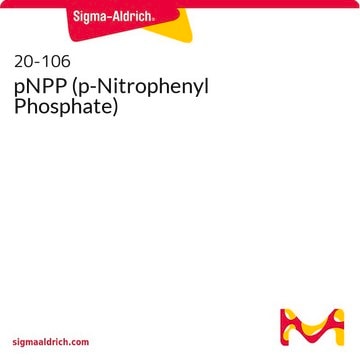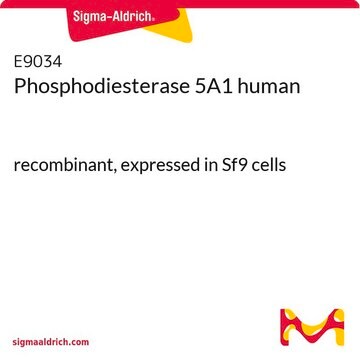N2881
4-Nitrophenyl phenylphosphonate
adenosine receptor agonist, 5′-Nucleotide Phosphodiesterase substrate
Sign Into View Organizational & Contract Pricing
All Photos(2)
About This Item
Empirical Formula (Hill Notation):
C12H10NO5P
CAS Number:
Molecular Weight:
279.19
MDL number:
UNSPSC Code:
12352204
PubChem Substance ID:
NACRES:
NA.32
Recommended Products
Quality Level
Assay
≥98% (TLC)
form
powder
solubility
acetone: 50 mg/mL, clear, faintly yellow
storage temp.
−20°C
SMILES string
OP(=O)(Oc1ccc(cc1)N(=O)=O)c2ccccc2
InChI
1S/C12H10NO5P/c14-13(15)10-6-8-11(9-7-10)18-19(16,17)12-4-2-1-3-5-12/h1-9H,(H,16,17)
InChI key
NRGZTHQFAQCJCQ-UHFFFAOYSA-N
Substrates
5′-Nucleotide Phosphodiesterase substrate
Storage Class Code
11 - Combustible Solids
WGK
WGK 3
Flash Point(F)
Not applicable
Flash Point(C)
Not applicable
Personal Protective Equipment
dust mask type N95 (US), Eyeshields, Gloves
Choose from one of the most recent versions:
Certificates of Analysis (COA)
Lot/Batch Number
Don't see the Right Version?
If you require a particular version, you can look up a specific certificate by the Lot or Batch number.
Already Own This Product?
Find documentation for the products that you have recently purchased in the Document Library.
H J Deussen et al.
Bioorganic & medicinal chemistry, 8(3), 507-513 (2000-03-25)
A bifunctional activity label (8) for directed molecular evolution of lipolytic enzymes has been designed and synthesized. The structure is composed of a 4-nitrophenyl activated phosphonate, that is, a suicide substrate of lipases/esterases, connected to a biotin moiety through a
M Labadie et al.
Biochimie, 61(9), 1091-1094 (1979-01-01)
A "Batch" microcalorimeter is used at 30 degrees C for the study of the hydrolysis of 4-nitro-phenylphenylphosphonate with a calf-intestinal phosphonate esterase, in a tris buffer, pH 8. The yield of enzymatic hydrolysis is estimated by spectrophotometric determination of the
Hydrolysis of a phosphonate ester catalyzed by an enzyme from Dictyostelium discoideum.
E F Rossomando et al.
Archives of biochemistry and biophysics, 197(1), 364-366 (1979-10-01)
D S Tawfik et al.
Analytical biochemistry, 202(1), 35-39 (1992-04-01)
Several laboratories have now shown that monoclonal antibodies having enzyme-like properties can be generated. The generation of catalytic antibodies makes use of the same basic procedures that have been used for the generation of binding monoclonal antibodies, yet the process
O A Moe et al.
The Journal of biological chemistry, 258(11), 6941-6946 (1983-06-10)
Extensive kinetic studies of bovine intestinal 5'-nucleotide phosphodiesterase as a function of pH have confirmed and amplified the catalytic mechanism previously proposed on the basis of isolation of a covalent phosphorylated intermediate (Landt, M., and Butler, L.G. (1978) Biochemistry 17
Our team of scientists has experience in all areas of research including Life Science, Material Science, Chemical Synthesis, Chromatography, Analytical and many others.
Contact Technical Service







